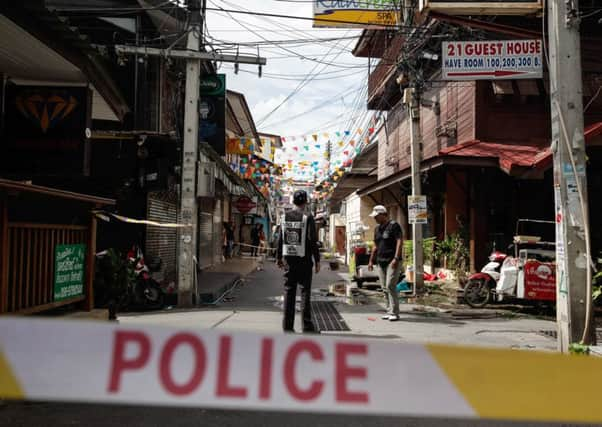Leader comment: Carnage in Thailand as tourists are targeted


The bombs in Thailand are an outrage and our thoughts and sympathy go out to those who lost loved ones and the many, many more who now fear for their loved ones.
Now another part of the world holds a threat for holidaymakers at a time when the threat-free world is already rapidly shrinking.
Advertisement
Hide AdAdvertisement
Hide AdIn these attacks the very popular resorts of Hua Hin and Phuket were targeted and that that can only mean that tourists were the intended victims.
Thailand has seen attacks such as these before, but they have been restricted to the south of the country, and the police say that the bombs used lead them to beleive that it is the same internal separatists responsible for these bombings.
The conflict in the south, which has been going on for around 12 years and seeks to create an independent Islamic state, has been responsible for the deaths of more than 6,000 people.
But the move to target tourists is a new tactic. It is hard not to come to the conclusion that the new strategy is a direct response to the flawed Thai referendum last weekend.
In that the military proposed a new constitution that will effectively hand the military more power and take power away from the electorate. Every one of Thailand’s big political parties rejected the proposed constitution.
The public did vote to back the new constitution but the army clamped down on any opposition in the run up to it, dozens of opponents were arrested and there were 200,000 police deployed in the streets. Unsuprisinly turn-out was low. It would seem the response to that anti-democratic swing is to try and ramp up the pressure.
And targeting toursism is bound to put massive pressure on the government.
The Foreign Office has issued its advice to toursits including “avoid public places”. Not many peope will opt for a holiday destination if they have to stay within hotels or compounds once they get there.
Advertisement
Hide AdAdvertisement
Hide AdThe timing of these bombs is also significant, just days before the one-year anniversary of a bomb blast at the Erawan shrine in Bangkok that killed 20 people.
The motive for that attack has still not been established. Interestingly, figures for tourism in Thailand show there was some loss of momentum during the months of September and the fourth quarter of 2015 with only minor increases in visitor numbers in these months.
This was widely attributed to the wide publicity that followed the shrine bombing.
Overall 2015 saw a huge increase in tourists visiting the country, up 5 million on the previous year to a total of 29 million visitors. And that obviously has a huge part to play in their economy, supporting overall an estimated 5.4 million jobs, some 14 per cent of the work force.
No wonder it is an attractive target for the separatists.
It is likely to be in the nature of the military rulers to seek to combat this new threat with arrests and curfews, but we know from many other areas this approach is seldom successful. The only real way to combat this is to return to political dialogue.